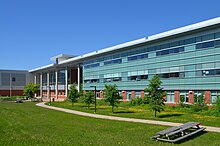
Halifax, Nova Scotia has the largest selection of education options in Atlantic Canada.

Halifax, Nova Scotia has the largest selection of education options in Atlantic Canada.
The Halifax Regional Centre for Education (HRCE) is responsible for administering 135 public schools, divided into elementary, junior high and high school levels, providing instruction from primary to grade 12. With over 57,000 students, the HRCE is the largest school board in Atlantic Canada. [1] The Conseil scolaire acadien provincial operates six public French language schools in the Halifax region. [2]

There are 14 independent schools in the city, including:

The city is home to seven degree-granting post-secondary educational institutions. The following universities are located on the Halifax Peninsula:
This university is located in suburban Rockingham:
The former Technical University of Nova Scotia (TUNS) was merged into Dalhousie University. The University of King's College remains an independent institution but its students have access to Dalhousie's arts and science faculties.
Cape Breton University has a satellite campus in Halifax for extension courses.
The Nova Scotia Community College network maintains three campuses in Halifax.
There are also a variety of private career and business colleges located in and around Halifax's urban core.

Dalhousie University is a large public research university in Nova Scotia, Canada, with three campuses in Halifax, a fourth in Bible Hill, and a second medical school campus in Saint John, New Brunswick. Dalhousie offers more than 4,000 courses, and over 200 degree programs in 13 undergraduate, graduate, and professional faculties. The university is a member of the U15, a group of research-intensive universities in Canada.
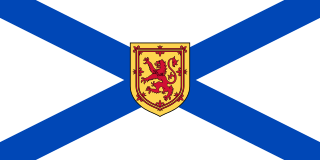
Nova Scotia is one of the thirteen provinces and territories of Canada. It is one of the three Maritime provinces and one of the four Atlantic provinces. Nova Scotia is Latin for "New Scotland."
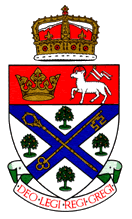
The University of King's College, established in 1789, is in Halifax, Nova Scotia, Canada. It is the oldest chartered university in Canada, and the oldest English-speaking university in the Commonwealth outside the United Kingdom. The university is regarded for its Foundation Year Program, a comprehensive and interdisciplinary examination of Western culture through great books, designed for first-year undergraduates. It is also known for its upper-year interdisciplinary programs – particularly its contemporary studies program, early modern studies program, and its history of science and technology program. In addition, the university has a journalism school that attracts students from across the world for its intensive Master of Journalism programs and its Master of Fine Arts in creative nonfiction, the first of its kind in Canada. Its undergraduate journalism programs are known for leading content in digital formats.

Halifax is the capital and largest municipality of the Canadian province of Nova Scotia, and the largest municipality in Atlantic Canada. Halifax is one of Canada's fastest growing municipalities, and as of 2022, it is estimated that the CMA population of Halifax was 480,582, with 348,634 people in its urban area. The regional municipality consists of four former municipalities that were amalgamated in 1996: Halifax, Dartmouth, Bedford, and Halifax County.
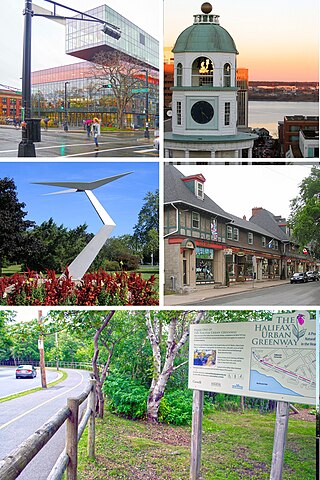
The Halifax Peninsula is a peninsula within the urban area of the Municipality of Halifax, Nova Scotia.
The Faculty of Agriculture at Dalhousie University is a Canadian agricultural college and faculty of Dalhousie University located in Bible Hill, Nova Scotia. The Faculty of Agriculture offers the only university level programs in agriculture in Atlantic Canada. Founded 14 February 1905 as the Nova Scotia Agricultural College within the Nova Scotia Department of Agriculture, it merged with Dalhousie University on 1 September 2012. The campus is referred to as Dalhousie University's "Agricultural Campus" or by its popular sports nickname of "Dal AC" or simply the "AC."

Atlantic School of Theology (AST) is a Canadian public ecumenical university that provides graduate level theological education and undertakes research to assist students to prepare for Christian ministries and other forms of public leadership. It is located in Halifax, Nova Scotia, Canada, and its enrolment is approximately 160 degree and non-degree students. Persons of all religious traditions, or none, are welcome to study at AST.

The South End is a neighbourhood within Halifax's urban area, in the Municipality of Halifax, Nova Scotia, Canada.

Pictou Academy (PA), founded in 1815 by Dr. Thomas McCulloch, is a secondary school in Pictou, Nova Scotia. Prior to the twentieth century, it was a grammar school; a liberal, nonsectarian degree-granting college; and then a secondary school. Pictou Academy's current principal is Starr Pettipas. The Pictou Academy Educational Foundation provides additional funds to the school.

Hosting the region's largest urban population, Halifax, Nova Scotia is an important cultural centre in Atlantic Canada. Halifax is home to a vibrant arts and culture community that enjoys considerable support and participation from the general population. As the largest community and the administrative centre of the Atlantic region since its founding in 1749, Halifax has long-standing tradition of being a cultural generator. While provincial arts and culture policies have tended to distribute investment and support of the arts throughout the province, sometimes to the detriment of more populous Halifax, cultural production in the region is increasingly being recognized for its economic benefits, as well as its purely cultural aspects.
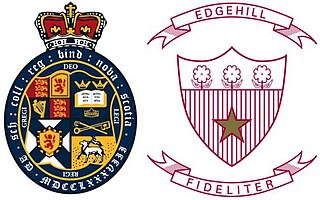
King's-Edgehill School is a Canadian private university-preparatory boarding and day school located in the town of Windsor, Nova Scotia. It is the oldest English independent school in the Commonwealth outside the United Kingdom, founded by United Empire Loyalists as King's Collegiate School in 1788, and granted Royal Charter by King George III in 1802.
Saint Mary's University (SMU) is a formerly Catholic, public university located in Halifax, Nova Scotia, Canada. The school is best known for having nationally leading programs in business and chemistry. The campus is situated in Halifax's South End and covers approximately 32 hectares.
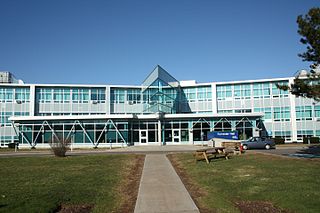
The Nova Scotia Teachers College (NSTC) was a normal school located in the Canadian town of Truro, Nova Scotia.

Higher education in Nova Scotia refers to education provided by higher education institutions. In Canada, education is the responsibility of the provinces and there is no Canadian federal ministry governing education. Nova Scotia has a population of less than one million people, but is home to ten public universities and the Nova Scotia Community College, which offers programs at 13 locations.

The Faculty of Medicine at Dalhousie University, also known as Dalhousie Medical School, is a medical school and faculty of Dalhousie University in Halifax, Nova Scotia, Canada.

The Acadian Federation of Nova Scotia was created in 1968 with a mission to "promote the growth and global development of the Acadian and Francophone community of Nova Scotia."

Darrell Samson is a Canadian politician who has served as the member of Parliament (MP) for Sackville—Preston—Chezzetcook since 2015. He is a former superintendent of the Conseil scolaire acadien provincial, Nova Scotia's Acadian and Francophone school board.